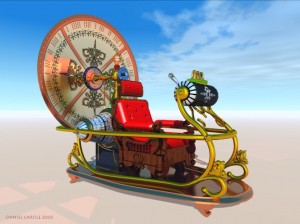Time travel – yes we can!

Out of time … already?
Our common everyday view of time is actually an out of date one. It is the one that Isaac Newton constructed and it sees time as something that is independent so that we have no control over it. Thus, like Newton, you probably think that time goes by at a constant rate. (Someone once said: time passes at a rate of one second every second – which is a stupid thing to say of course as you cannot measure something against itself!)
 So Newton’s idea of time is that there is a hypothetical cosmic clock that counts the seconds, minutes, hours and years everywhere in the Universe at the same rate, because it is independent of the Universe. It is outside of space.
So Newton’s idea of time is that there is a hypothetical cosmic clock that counts the seconds, minutes, hours and years everywhere in the Universe at the same rate, because it is independent of the Universe. It is outside of space.
Then, along came Albert Einstein in 1905 and changed all this. He said that time and space are not independent: Einstein argued that time and space are mixed up in a way that means two people do not measure the same rate of time – if they are moving relative to each other.
And this effect gets bigger the faster the people are moving. So if you strap a clock to a high-speed rocket (and by high speed, I mean faster than anything we have at the moment. This clock has to be travelling at almost the speed of light – which is the fastest speed in the universe at 300 million m/s). So imagine there’s this fast-moving clock, and you look at the arms of the clock as it flashes past. What will you see? You will see that the second-hand on this clock is moving at a slower rate than the second-hand of an identical clock by your side.
Now this has nothing to do with how long it takes the light to reach your eyes or the speed of the rocket affecting the mechanics of the clock. It is literally that time itself has slowed down for the rocket clock. If there were a person on board the rocket you would see them doing everything in slow motion. Their time, their biological clock everything is running slower.
So Is Time Travel Possible?
Now this idea that time is ‘relative’ is not mere science fiction – it is supported by observations! We see it all the time in our experiments with subatomic particles that DO travel at such speeds. Note the word ‘relative’ there. Einstein’s special theory of relativity says that all motion is relative. So if you were on board that rocket, you could just as well say that the rocket wasn’t moving and that the earth was moving at close to light speed in the opposite direction. And if you were on the rocket (not the Earth) the really spooky thing is you would see Earth’s clocks slow down and everything on Earth running in slow motion.
 It’s mind boggling at first, but from a scientific perspectiv
It’s mind boggling at first, but from a scientific perspectiv e it makes sense.
e it makes sense.
It’s mind boggling at first, but from a scientific perspective it makes sense. It means no one has a monopoly on how fast time goes by or how long it takes for something to happen. And things get really interesting when you not only travel very fast, but CHANGE how fast you’re going – so speed up and slow down. Einstein later showed that when you accelerate and decelerate it is not just your speed that changes: time itself runs a little slower. And even gravity, that stuff that you thought Newton had sown up, turns out to affect how fast time goes by. So time on Earth goes by slightly slower than time out in space because we are immersed in Earth’s gravitational field.
All this slowing down of time actually gives us a way of travelling into the future. Basically, you need one of two things: either a superfast rocket than can take you near light speed (to do all that speeding up and slowing down and so slow your time down) or find yourself a strong gravitational field like a that of a neutron star to orbit around for a while.  So here’s the plan: you head very fast into space and because your time slows down, for you the trip takes a shorter duration (let’s say one year). But back on Earth clocks are running at their normal rate so count more years going by. When you get back you will find that maybe 10 years have gone by on Earth (the numbers are not important, the closer you can get to the speed of light, or the stronger the gravitation field you find, the more the difference between your journey time and the Earth’s).
So here’s the plan: you head very fast into space and because your time slows down, for you the trip takes a shorter duration (let’s say one year). But back on Earth clocks are running at their normal rate so count more years going by. When you get back you will find that maybe 10 years have gone by on Earth (the numbers are not important, the closer you can get to the speed of light, or the stronger the gravitation field you find, the more the difference between your journey time and the Earth’s).
So if you return to Earth one year older you will find that everyone on Earth is 10 years older. So you have essentially time travelled nine years into the future. As you see, time travel into the future is indeed possible. All we need to build is a fast enough rocket. We wouldn’t be breaking any laws of physics, and in fact we can be confident it would work because it has already been done on a smaller scale …
 on a grander scale, you can fast-forward to the future and get there bef
on a grander scale, you can fast-forward to the future and get there bef ore everyone else
ore everyone else
In 1971 scientists flew atomic clocks twice around the world (east and west) then compared them with clocks on the ground after the journeys. They were out by a few billionths of a second, just as Einstein’s theory predicted. In fact, there were two effects happening. Because the travelling clocks were moving fast, this makes them count time more slowly. BUT because the clocks were further from the Earth’s gravity, this has the effect of speeding them up. Fortunately from the point of view of testing Einstein’s theory, the two effects don’t cancel exactly.
So time travel into the future not only can be done but it has been done, even if it is just a few nanoseconds. But, I hear you complain, this isn’t real time travel surely – a few nanoseconds? What use is that? Well, I grant you it’s hardly the stuff that movies are made of. But this is still real time travel and if you can make it work on a grander scale, you can fast-forward to the future and get there before everyone else.
Can we Visit the Past?
The issue we address now is whether, having got to the future, if you discover you don’t like it, can you return to your own time? Thus, are we able, according to what we know of the laws of physics and the nature of time, to travel back into our past?
Well, ten years after Einstein published his work on what is called Special Relativity (time being the fourth dimension, E=mc2 and all that business) he completed his greatest work, which is called his General Theory of Relativity. This is a theory about gravity and it says that space-time is – to coin a great term – ‘warped’.
 Einstein’s theory of gravity is ‘better’ than Newton’s law of gravity in that it is more precise. Unfortunately the maths is ho
Einstein’s theory of gravity is ‘better’ than Newton’s law of gravity in that it is more precise. Unfortunately the maths is ho rribly difficult.
rribly difficult.
Einstein’s theory of gravity is ‘better’ than Newton’s law of gravity in that it is more precise. Unfortunately the maths of general relativity is horribly difficult.
Luckily for us, mathematicians have worked long and hard and have solved the equations of general relativity and figured out what it all means. As far as time travel is concerned, general relativity does allow for what are called ‘Closed timelike curves’. These are circular routes through curved spacetime in which time itself is bent round in a circle. If you were to follow such a path you would feel as though you were just travelling through space normally but would in fact arrive back at your starting point before you set off – thus time travelling into the past. This theory is not (yet?) supported by evidence.
Time Loops
It has been known for a long time that general relativity allows for the existence of these time loops. One of the first people to study them was van Stockum in 1937. He suggested that if you have an infinitely long cylinder of very densely-packed material spinning rapidly in empty space, then general relativity predicts that the region of spacetime surrounding the cylinder should be twisted around it and could contain a time loop. Then in 1974 a young American by the name of Frank Tipler took van Stockum’s idea a step further. He suggested that we might be able to get away with a cylinder just 100 kilometres long and 10 kilometres wide. How we might build this and out of what kind of material we have no idea.
 Most scientists don’t believe that travelling back to the past is possible because of the many parado
Most scientists don’t believe that travelling back to the past is possible because of the many parado xes it throws up.
xes it throws up.
However, Tipler pointed out that these were practical problems and, anyway, who knows what might be technologically possible in the distant future. To use a Tipler cylinder time machine, you would have to orbit around it a few times and then, says the theory, you would return to Earth, arriving back in the past. How far back depends on the number of orbits you made.
So we have our current best theory about the nature of time (general relativity) and this says time travel to the past is at least theoretically possible. What is stopping us from building a time machine? More to the point, why is it that most physicists you might care to ask, would say it’s impossible. The answer is that you don’t need physics to persuade you that time travel into the past is unlikely … just just need common sense.
 some would argue at this point that this paradox does not imply that time travel into the past is forbidden, just that there are certain rules a
some would argue at this point that this paradox does not imply that time travel into the past is forbidden, just that there are certain rules a ssociated with it
ssociated with it
The reason why most scientists don’t believe that travelling back to the past is possible in practice is because of the many mind-boggling paradoxes it throws up. For example, what if you were to go back in time, to last year say, and kill your younger self. What happens then? Do you suddenly pop out of existence as the younger you slumps to the ground? After all, the older you can’t now have existed. But… if you died last year.. who KILLED you? It seems you are unable to kill yourself because you must survive the assassination attempt to become the assassin. What you have to remember about time travel to the past is that you are allowed to meddle with history as long as things turn out the way they do. You cannot change the past. Mind you, some would argue at this point that this paradox does not imply that time travel into the past is forbidden, just that there are certain rules associated with it.
Where Are All the Time Travellers?
Stephen Hawking once famously asked – if time travel to the past were possible, why is it that we have not been visited by any time travellers from the future? After all, our time, to them, is in the past. If future generations ever succeed in building a time machine then surely there will be some who would wish to visit the early 21st century. Of course it may be that time travellers from the future are indeed among us but simply choose to keep a low profile. But we’re not finished yet! Here are two more possibilities that would explain why so far we’ve seen no one from the future.
First of all, if we ever do succeed in building a time machine, then it could only take us as far back as the moment it was switched on (because of the way it would hook up space and time). So, this means we shouldn’t expect to see time travellers from the future because time machines have not been invented yet.
Another possibility is even weirder than time travel itself. It turns out that our Universe may not be the only one. Some scientists have proposed that this Universe is just one of an infinite number of parallel Universes. In that case, perhaps time travel to the past slides the traveller into a parallel world. This idea kills two birds with one stone.

Firstly it addresses why we haven’t met any time travellers from the future: There are so many of these parallel realities that our universe is just not one of the lucky few that have been visited. Secondly, parallel universe removes any paradoxes. If you were to travel to the past, and in so doing, slide into a parallel universe then you can kill the ‘other’ you without any problem, apart from, one hopes, a guilty conscience of course.
And on that note, I shall finish. Time, after all, is short (and also, as you now know – relative!)
by guest writer, Professor Jim Al-Khalili
